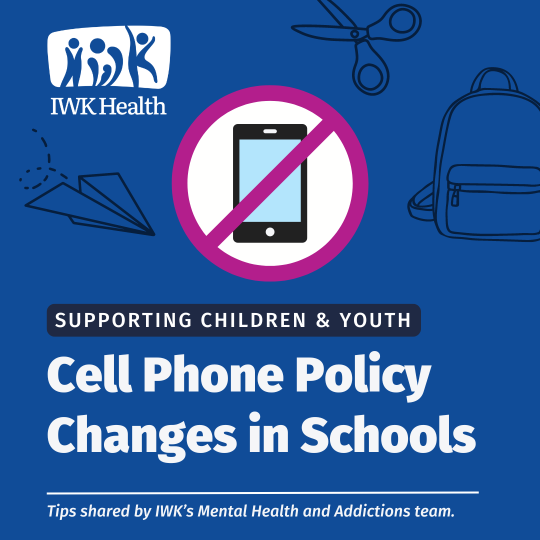How can we support children and youth with the new policy?
How children and youth respond to change is unique. Many children or youth will pivot and adapt to change quickly while others will require more time to cope with changes.
- Be informed about the harmful effects of cell phone use to help explain to children/youth why this change will be beneficial.
- Acknowledge that change can be difficult and that for some children and youth this may feel like a loss (i.e. fear of missing out, loss of safety, or loss of perceived safety). Increase empathy and consider where the person is coming from in response to change.
- For some children and youth restricting their phone access can be unsettling. Make sure that children/youth have support and a plan to address their needs (i.e., knowing who to reach out to in school for support, ensure school is aware in order to link student to services as needed).
- Listen and validate. Support youth by leaning into conversations about this new policy (i.e., encourage discussions about concerns about the policy, do they see an upside to the policy, what coping skills can they use to adapt).
- Reassure children and youth that they can still connect with their friends and family without cell phone use. Engage students in positive, constructive activities that promote supporting relationships, coping skills, resilience, wellbeing, and a sense of community connectedness (i.e., acts of kindness, volunteering, board games, cards, team crafts/sports, outdoor activities, etc.).
- School cell phone bans are one part of the solution. Encouraging healthy cell phone use outside of schools will help support the new cell phone policy. Offer important information on cell phone usage (i.e., online safety, what’s real and not real, reliable sites, the dangers of certain apps, etc.). See the resource list below.
- Model healthy cell phone use in front of children and youth. Your use of cell phones will serve as a model of appropriate cell phone use in public situations (i.e., set boundaries around technology use in your home and in public, encourage more ‘offline’ connection and activities). Help provide tips around managing boredom.
- Encourage practical strategies to help cope without having a cell phone in class. Help youth adapt by offering strategies such as using breathing exercises, grounding exercises, mindfulness, fidgets, stretching, drawing, focusing on task, asking for help, etc.
- If you are noticing that someone is having challenges or symptoms of withdrawal from less phone use (i.e., inability to limit cell phone usage, increases in experiencing distress, anxiety, depression, or irritability when they do not have their phone), please connect with school supports. Most of these symptoms will improve over time with support and engagement in non-phone related activities in school.
- Consider that children and youth may have unique needs and/or combination of needs (i.e. learning, cultural, social, community, medical, mental health, etc.) that may require additional planning and collaborations to address.
Additional Resources
- Social media: What parents should know | Caring for kids (cps.ca)
- Screen time and digital media: Advice for parents of school-aged children and teens | Caring for kids (cps.ca)
- Digital media: Promoting healthy screen use in school-aged children and adolescents | Canadian Paediatric Society (cps.ca)
- Browse Resources | MediaSmarts
- Teenage Boredom: How Parents Can Help Their Teenagers (axis.org)
Need help now?
Emergency: 911
Nova Scotia Mental Health and Addictions Crisis Line: 1-888-429-8167*
Kids Help Phone: 1-800-668-6868 or text CONNECT to 686868*
*These hotlines are toll-free. In an emergency, you can also go to your closest emergency department.
Need mental health and addictions services?
IWK & NSH Mental Health and Addictions Central Intake: 1-855-922-1122*
*Self-referral
